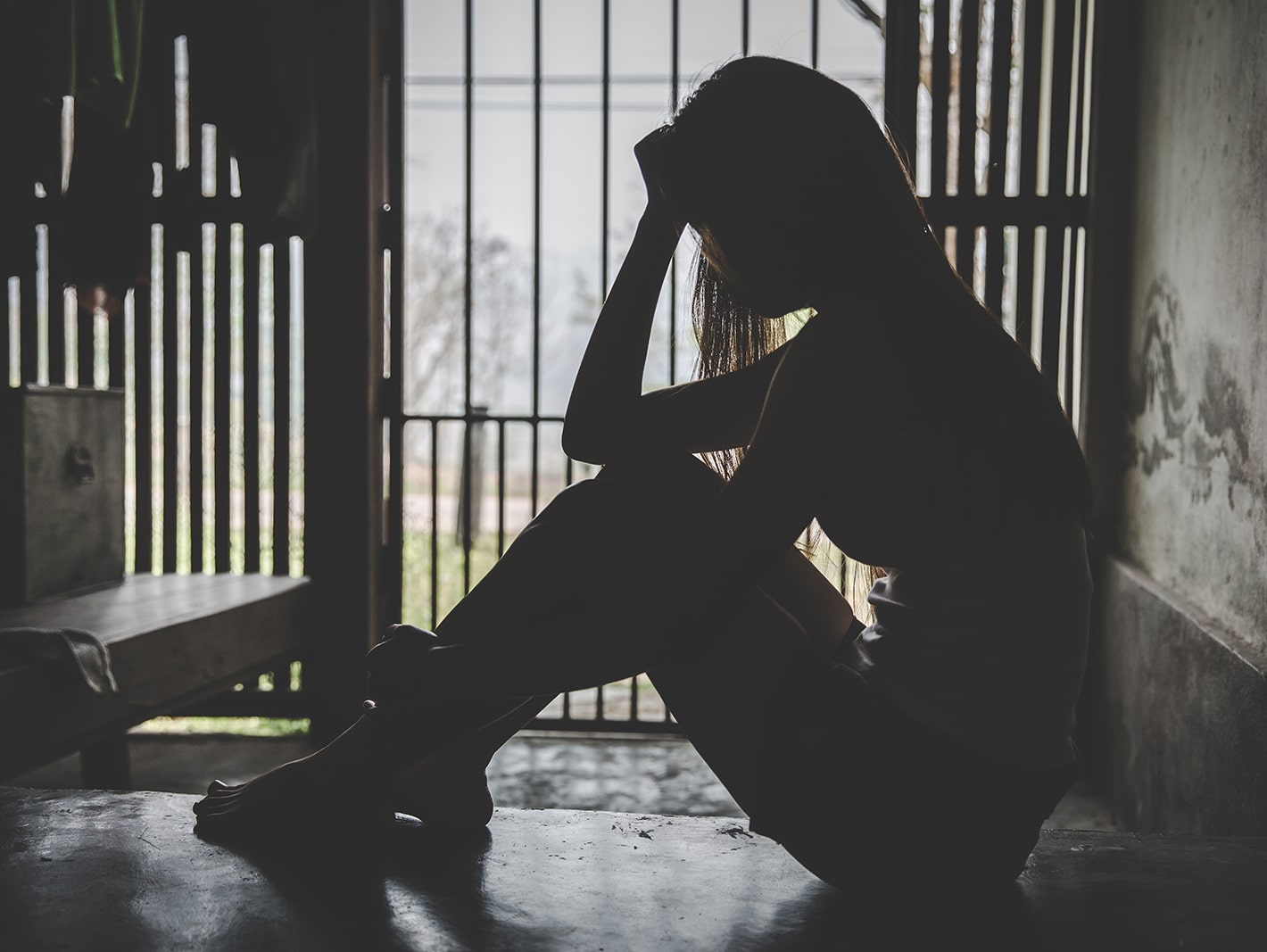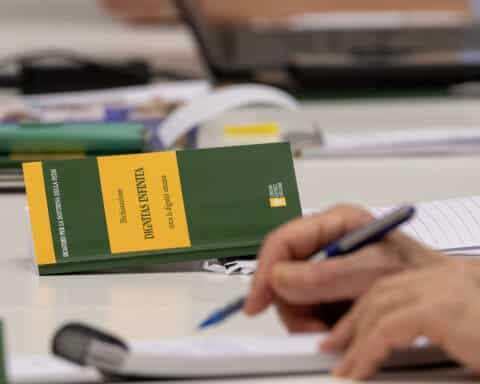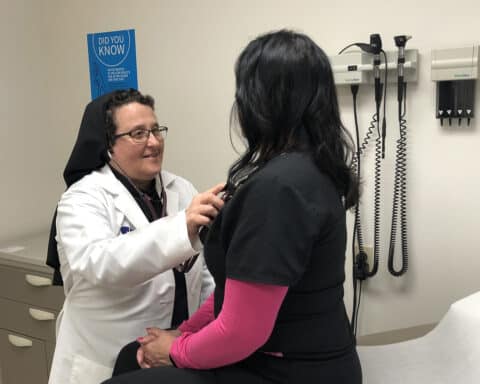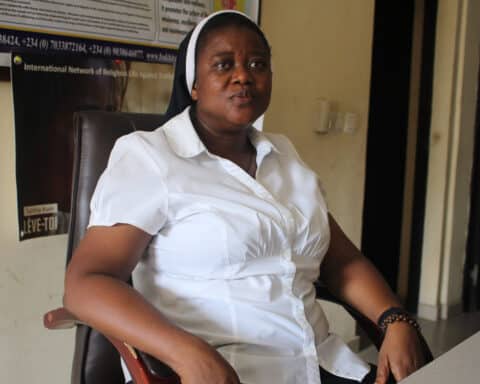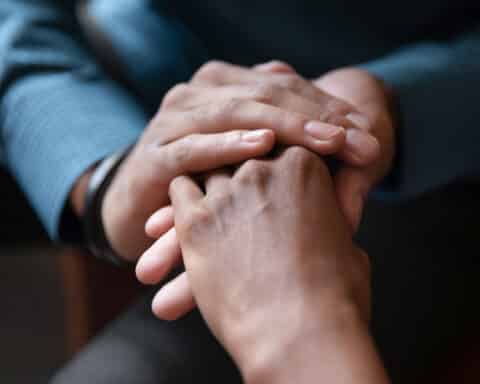More than 50 years later, Kris still remembers the face of Satan.
She never meant to meet him. The encounter came after she, at 18 years old, hopped off a train in Chicago while working her way east toward the Woodstock Music Festival. At the station, she said, one of his recruiters approached her.
Within two minutes, the recruiter learned that the penniless teenager from the Midwest didn’t know the city, didn’t know anyone there, and didn’t have anywhere to stay. By five minutes, he offered Kris — a self-described hippie and risk taker — LSD and a place to stay.
Kris soon found herself in a small, two-bedroom apartment surrounded by other girls her age. She realized it was a gang-run human trafficking operation only after she met the boss, a man called Satan.
“I still occasionally will have a nightmare with this guy in it,” she said, remembering his beady, feral eyes and the giant scar running down the side of his face. “I’ll never forget it.”
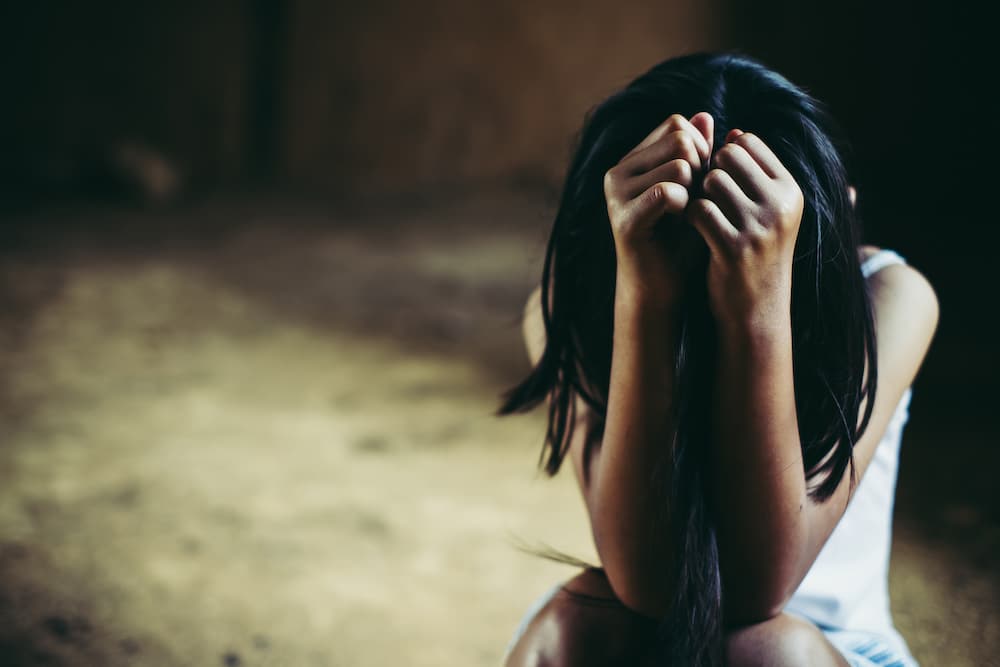
After greeting her, Satan informed her that she would have sex for money, which she would then hand over to them. When Kris decided to leave, he beat up another girl until she bled.
“If you don’t do what we say, whenever we say it, then that’s what will happen to you,” she said he warned.
Next, they threw Kris down, raped her, and branded her with their gang symbol.
Traffickers, Kris emphasized, are terrorists. Her captors valued loyalty and obedience while weaponizing fear and drugs. At first, they never left her alone, even in the bathroom. But, she said, they rewarded her with more freedom when she returned to them after visiting her father (they threatened to kill the other girls if she didn’t).
Escaping the gang
She planned to escape after she witnessed Satan slit another man’s throat. She began charging more for “tricks” or sexual acts and hid the extra money behind a bathroom tile.
Her opportunity came when her traffickers got high on heroin. They wanted something from the bodega and, taking a chance, Kris offered to go. She ran to the train station. She fled home.
And, for the next 40 years, she kept her story a secret.
Today, Kris, who asked to be called by her first name for this story, serves as the executive director of the Justice Project of Kansas City, a nonprofit that supports women struggling with poverty, including women who have been sexually exploited.
While she is not Catholic, Kris partners with Catholic sisters: She began her organization with Sister Donna Ryan, RSM, and works closely with Sister Jeanne Christensen, RSM, a board member for the U.S. Catholic Sisters Against Human Trafficking (USCSAHT), a network that fights to end human trafficking.
Several anti-human trafficking experts told Our Sunday Visitor that Catholic sisters, in a special way, help lead the fight against human trafficking. These sisters do everything from informing the public about the issue to walking with survivors.
Today, these sisters stress that human trafficking exists and that every Catholic has a role in the fight to protect human dignity, beginning with educating themselves about the issue.
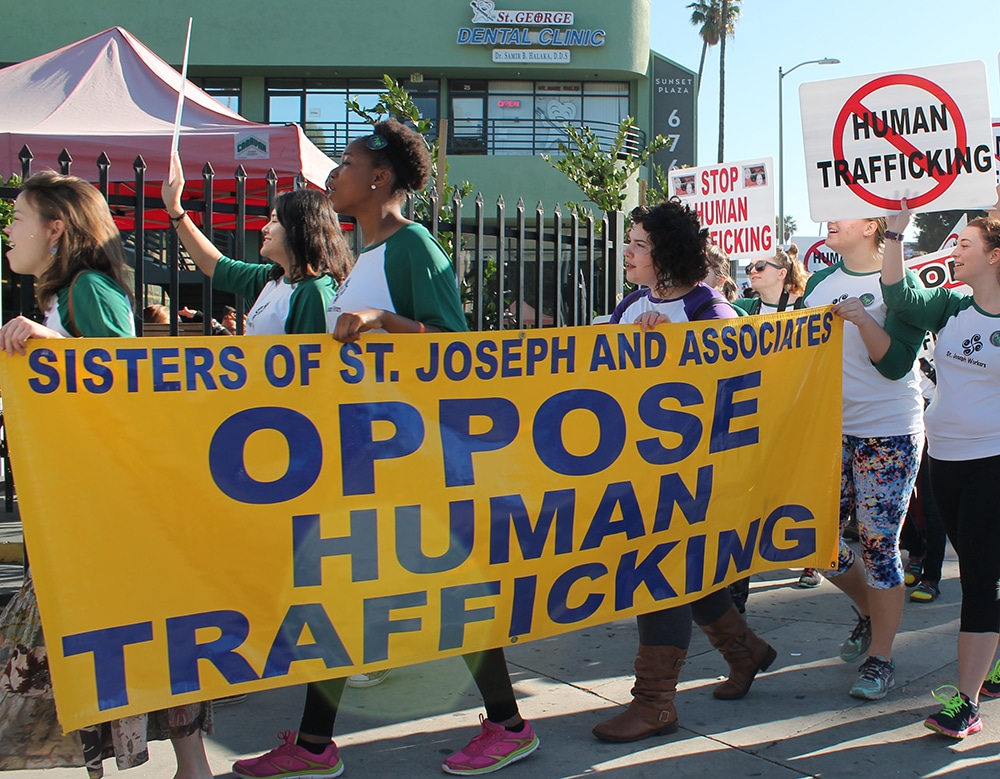
A look at human trafficking
Anti-human trafficking advocates urge that human trafficking happens everywhere, including in the United States.
“Many times, I will be giving a presentation, and as soon as I mention human trafficking, someone will say that it does not happen here,” Sister Maryann Mueller, CSSF, the Justice and Peace Coordinator for the Felician Sisters of North America and a USCSAHT board member, said. “I stress that it occurs in every zip code.”
The U.S. recognizes two primary forms of human trafficking: forced labor and sex trafficking.
According to the 2023 Trafficking in Persons Report by the U.S. Department of State, human trafficking refers to a crime “whereby traffickers exploit and profit at the expense of adults or children by compelling them to perform labor or engage in commercial sex.”
“There’s been a long history of faithful members of the Catholic Church recognizing the dignity of the most marginalized in our society and serving them.”
— Mary Graw Leary
The report clarifies that it is a crime to use anyone younger than 18 to perform a commercial sex act regardless of whether force, fraud or coercion are involved.
Experts cite the U.S. Trafficking Victims Protection Act of 2000 (the TVPA) and its subsequent reauthorizations as well as the UN Protocol to Prevent, Suppress and Punish Trafficking in Persons (the UN TIP Protocol) as two actions combating human trafficking.
The UN TIP Protocol, which more than 180 nations have ratified or acceded, more broadly defines human trafficking as “the recruitment, transportation, transfer, harboring or receipt of persons, by means of the threat or use of force or other forms of coercion, of abduction, of fraud, of deception, of the abuse of power or of a position of vulnerability or of the giving or receiving of payments or benefits to achieve the consent of a person having control over another person, for the purpose of exploitation.”
Trafficking on the rise
Nearly 50 million people — close to one of every 150 people — are exploited in modern slavery worldwide on any given day through forced labor or forced marriage, according to the Global Estimates of Modern Slavery for 2021.
The report released last year by the International Labour Organization, Walk Free, and the UN’s International Organization for Migration estimates that approximately 27.6 million of the 50 million were in forced labor. The U.S. relies on the 27.6 million estimate for human trafficking, since not all forced marriages fall under the legal definition of human trafficking.
Of the 27.6 million, an estimated 6.3 million people — with four out of five being girls or women — are in situations of forced commercial sexual exploitation at any point in time. An estimated 3.3 million children are in situations of forced labor, with more than half in commercial sexual exploitation.
“Young people are particularly at risk of trafficking and exploitation, especially since the COVID-19 pandemic began, and this is happening for many reasons. Traffickers are increasingly recruiting online, where younger generations have a strong presence.”
— Sister Abby Avelino
The numbers suggest the situation is worsening: Forced labor increased by more than 10% from 2016 to 2021, according to the report.
These numbers, experts stress, include people trafficked in the U.S. While estimates vary, the National Human Trafficking Hotline by Polaris, a major nonprofit dedicated to ending human trafficking, identified 10,360 cases for 2021 involving 16,710 victims.
“One of the biggest challenges we face not only in this country, but all over the world is the reporting of trafficking and actually having a true sense of how prevalent it is,” David Spicer, senior policy advisor for Migration and Refugee Services at the United States Conference of Catholic Bishops, pointed out.
| Stats |
|---|
|
27.6 million people are exploited in modern slavery worldwide on any given day through forced labor 16,710 victims of human trafficking were reported in the United States in 2021 4 out of 5 victims of sex trafficking are girls or women 3.3 million children are in situations of forced labor, with more than half in commercial sexual exploitation 10% Forced labor has increased by more than this much from 2016 to 2021 |
Sisters as leaders
Anti-human trafficking experts recognize Catholic sisters in the U.S. and worldwide for their efforts to combat human trafficking.
Mary Graw Leary, a professor of law at the Catholic University of America, noted that before people knew the term “human trafficking,” at least in the context of sex trafficking, women religious were ministering to and accompanying prostituted people.
“They’ve been doing this work for decades and decades,” she said. “I just think that’s always important for us to remember, right? That there’s been a long history of faithful members of the Catholic Church recognizing the dignity of the most marginalized in our society and serving them.”
Among other orders, she pointed to Talitha Kum, a global umbrella network gathering more than 6,000 religious sisters, allies and partners dedicated to ending human trafficking. USCSAHT, which represents more than 100 congregations of sisters, is the U.S. member of Talitha Kum.
Catholic sisters help in a direct way, such as at Mary’s Guest House in Chula Vista, California, and Dawn’s Place in Philadelphia. The two USCSAHT member-run houses provide residential programs and support for survivors.
Dignity of every person
Other organizations support Catholic sisters in their efforts against human trafficking, including the Arise Foundation, an anti-slavery nonprofit based in the U.K. and the U.S.
In 2022, Arise supported 103 anti-trafficking groups directly, the majority of which were made up of Catholic sisters, according to Tove van Lennep, head of communications and relationships.
“Our mission is to support frontline groups, especially Catholic sisters, to better prevent slavery and human trafficking in their communities,” van Lennep said, adding that Arise provides support through accompanied grant giving, direct partnership, training, and capacity building.
She shared why the group enjoys working with Catholic sisters: Communities trust them and human dignity guides them.
“Sisters are often uniquely positioned in remote and marginalized communities, where they have been part of the social fabric for decades,” van Lennep said. “With the trust of their communities and extensive local knowledge and experience, they are able to carry out anti-trafficking work highly effectively.”
She added: “A foundational belief in the dignity of every person inspires their unrivaled contribution to addressing human trafficking.”
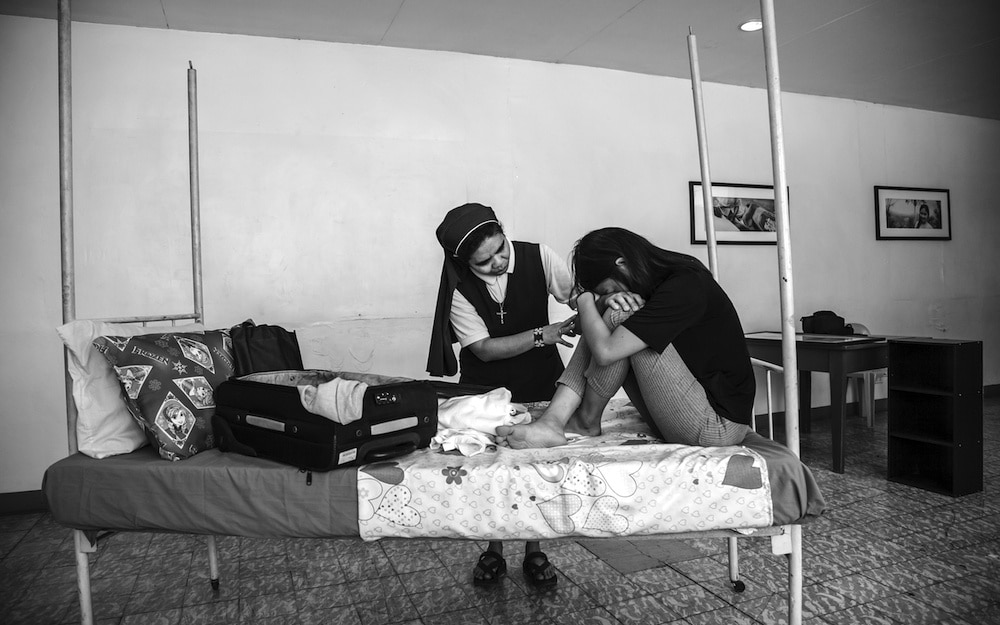
Sister-led networks focus on youth
Talitha Kum, a worldwide network representing thousands of sisters that began in 2009, tackles human trafficking in several ways.
“Talitha Kum’s mission is to end human trafficking and exploitation through collaborative initiatives focused around prevention, protection, spiritual accompaniment, social reintegration and rehabilitation of survivors, partnership and advocacy, promoting actions that tackle the systemic causes,” Sister Abby Avelino, MM, the international coordinator, described.
“We also use social platforms extensively to inform, prevent and raise awareness against trafficking,” she added. “We broaden our outreach by building partnerships, networking and advocacy activities, promoting actions that address the systemic causes of this global scourge.”
She highlighted causes exacerbating human trafficking today, including the COVID-19 pandemic, conflicts in countries, the war in Ukraine, and natural disasters. She expressed concern especially for young people.
“As consumers, we are all complicit with labor trafficking, and [there are] steps we can take to be more aware of the exploitation that occurs to provide our food, clothes and other consumer goods, and some alternatives such as buying locally, fair trade and made in America.”
— Sister Maryann Mueller
“Young people are particularly at risk of trafficking and exploitation, especially since the COVID-19 pandemic began, and this is happening for many reasons,” she added. “Traffickers are increasingly recruiting online, where younger generations have a strong presence.”
She highlighted the network’s youth outreach. Talitha Kum, she said, believes young people must play a central role in global mobilization.
“That is why we launched the Young Ambassadors Against Trafficking program, with the aim of promoting and strengthening the role of the younger generation in the fight against human trafficking,” she said of the program where young people worldwide commit to be leaders among their peers.
At USCSAHT, Sister Maryann also addressed youth.
“In the United States, many child victims still attend school and live at home,” she said. “If you are a parent, know what your children are doing online. Get their phone or device and check it out daily.”
“It is not a trust issue with your child; you want to protect your child as their parent,” she added. “Know who their friends are and be aware of any changes in your children.”
Dawn’s Place
Catholic sisters walk with survivors of human trafficking through residential programs that provide not only safe housing but also a myriad of services offering hope and healing.
In Philadelphia, Dawn’s Place is led by a sister and belongs to the Coalition of Catholic Organizations against Human Trafficking even though it is not faith-based.
“Dawn’s Place works with women who have been commercially sexually exploited and/or sex trafficked,” Sister Meaghan Patters, SSJ, the executive director said.
“Our vision is to provide a new beginning for survivors through our residential program which can accommodate eight women in private bedrooms,” she described. “We also have a transition house where up to two women can live independently after they graduate from the main house.”
Dawn’s Place, which receives referrals from Homeland Security, the FBI, courts, prisons and other social service agencies, has welcomed more than 110 women since 2009, according to its website.
Sister Meaghan stressed that Dawn’s Place offers an opportunity to pursue healing and a purpose in life.
“The comprehensive, individualized program at Dawn’s Place addresses the trauma endured by women who have been exploited for sex,” she said, adding that they partner with agencies to help address other issues that these women may face, including substance abuse and mental health disorders, legal and educational concerns, future occupation, housing and family relationships.
She listed some of their services, including music therapy, equine therapy and exercise therapy. The program staff, she added, includes a residential coordinator, an assistant residential coordinator, a case manager and a therapist.
Supporting all survivors
On the West Coast, Sister Christina MacLean, SMSM, and Sister Marie Lucie Tolojanahary, SMSM, run Mary’s Guest House, which began ministering to women survivors of human trafficking in 2005.
Their main purpose, Sister Christina said, is to provide a safe and long-term and homelike environment.
“We accompany them as mentors on their journey toward healing and empower them to become — we hope we do — empower them to become self-reliant,” she said of the women who come to them from different places, including police and the FBI.
Like Dawn’s Place, they work with other organizations to connect women to the services they need, from trauma-informed therapy to legal and immigration help.
Sister Christina also emphasized a priority on education and planning for the future.
“One of the big things that we have asked of the women that come to us is to really look at their education,” she said. “This has really been one way that the women have been able to get their lives together and also feel a sense of empowerment.”
In the past five years, Mary’s Guest House has provided services for 25 guests from 13 different countries, according to their website. Of those, 19 enrolled in community college or English classes or university (including six who also worked) and six became employed full time.
Mary’s Guest House, which is connected to a chapel, serves women regardless of their faith. The sisters encourage women of faith to continue in their own faith. When they encounter women angry with God because of what happened, the sisters help them work through that.
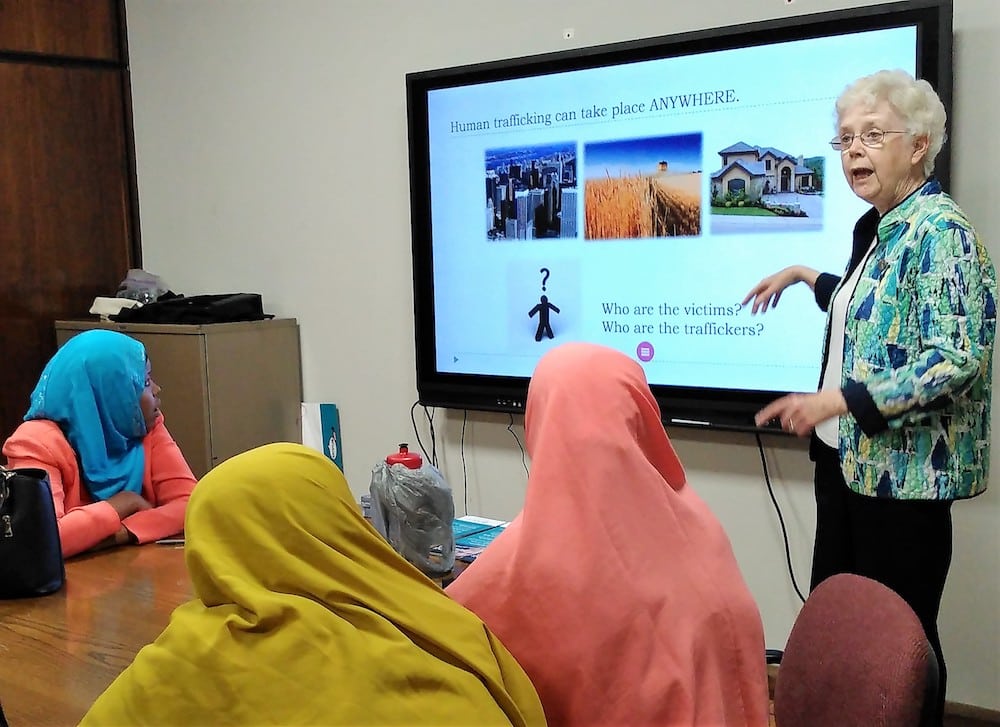
The importance of education
Everyday Catholics can also help combat human trafficking, beginning with educating themselves, several experts said.
Sister Maryann, who runs the USCSAHT’s monthly “Stop Trafficking” newsletter, recognized education as the key to preventing human beings from becoming victims. Among other things, she recommended learning the signs of human trafficking.
The State Department lists human trafficking indicators and questions to ask potential victims. Red flags include: Someone living with an employer; poor living conditions; inability to speak to an individual alone; answers appear to be scripted and rehearsed; employer is holding identity documents; signs of physical abuse; submissive or fearful; unpaid or paid very little; under 18 and in prostitution.
“If you suspect something, call the National Human Trafficking hotline and report it,” Sister Maryann recommended. “What you suspect may end up not being human trafficking, but it also may be the only chance a victim has to become a survivor.”
People can reach the hotline by calling 1-888-373-7888, texting 233733, or chatting online.
Catholics as consumers
Advocates also raised awareness around Catholics’ role as consumers.
“As consumers, we are all complicit with labor trafficking, and [there are] steps we can take to be more aware of the exploitation that occurs to provide our food, clothes and other consumer goods, and some alternatives such as buying locally, fair trade and made in America,” Sister Maryann said.
At Arise, van Lennep listed tools to purchase “slavery-free goods,” including apps such as Ethical Barcode or Good on You.
Leary at CUA pointed to resources by the U.S. Department of Labor, including reports and an app (Sweat and Toil) that name goods likely produced by forced labor or child labor.
“Slavery is interwoven into the fabric of our lives,” she said, stressing companies’ responsibility to refuse forced labor.
| Prayer to end trafficking |
|---|
|
Loving Father, Source: U.S. Conference of Catholic Bishops |
A call to action
Every person is needed in the fight against human trafficking, the sisters emphasized.
“This requires commitment truly from everyone, at the individual level, in our families and communities in prevention, awareness-raising, support for our mission by donation and prayer,” Sister Avelino at Talitha Kum said.
At Dawn’s Place, Sister Meaghan recommended Catholics pray, in particular, for the intercession of St. Josephine Bakhita, the patron saint of people who are victims and survivors of human trafficking.
She and other leaders encouraged Catholics to advocate for policy change as well as to support organizations serving those being trafficked and survivors.
The groups that spoke with Our Sunday Visitor invited people to get involved with their respective organizations and recommended everything from learning more by visiting their websites and signing up for their newsletters to volunteering or donating. For those interested in helping survivors directly, Dawn’s Place and Mary’s Guest House share wish lists.
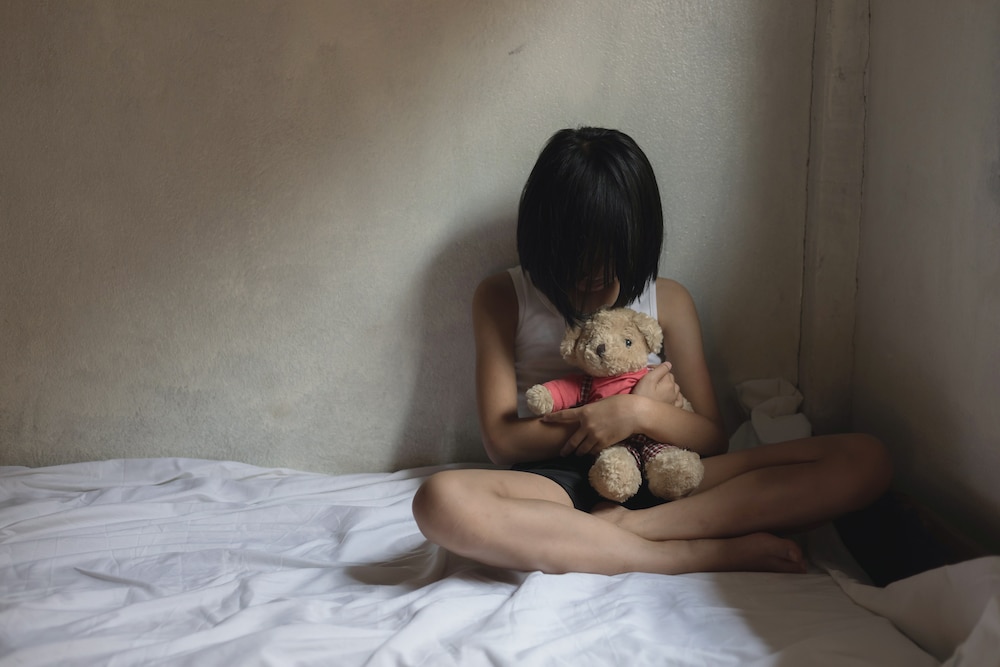
Making a difference
Survivors and those who care for them revealed the impact of love and reminding people of their own goodness.
Before encountering Satan, Kris described herself as a smart kid but also a troublemaker who did drugs, wrecked cars and had run-ins with the law. But she said, her parents’ unconditional love anchored her.
“They always told me, in spite of that, we will always love you,” she said. “You could always come here if you need to.”
Another survivor of human trafficking, Ann Marie Jones serves as the residential coordinator at Dawn’s Place. She remembered how one probation officer’s visit in jail impacted her.
“She said to me, ‘Why can’t you see in you what I see in you,'” Jones recalled. “I went back to my cell, looked in the mirror and said what is it that she sees in me that I don’t see in myself. The next thing I know, I was on my knees asking God to show me what she saw in me.”
A week later, she said, “I finally started seeing what she saw in me, that I was a good, kind, caring person that didn’t deserve to live the life I was living.”
Dawn’s Place also embraced her, she said, sharing that the people there “hugged me, showed me love, and taught me that I could trust somebody else.”
As someone who cares for survivors, Sister Christina emphasized how human trafficking steals the body and the soul of a person. But, she said, when given the opportunity to change, women are resilient.
“One of the things that, in some ways, is a real joy,” she concluded, “is when you see them begin to discover their own goodness and to know that they are valued and loved.”

